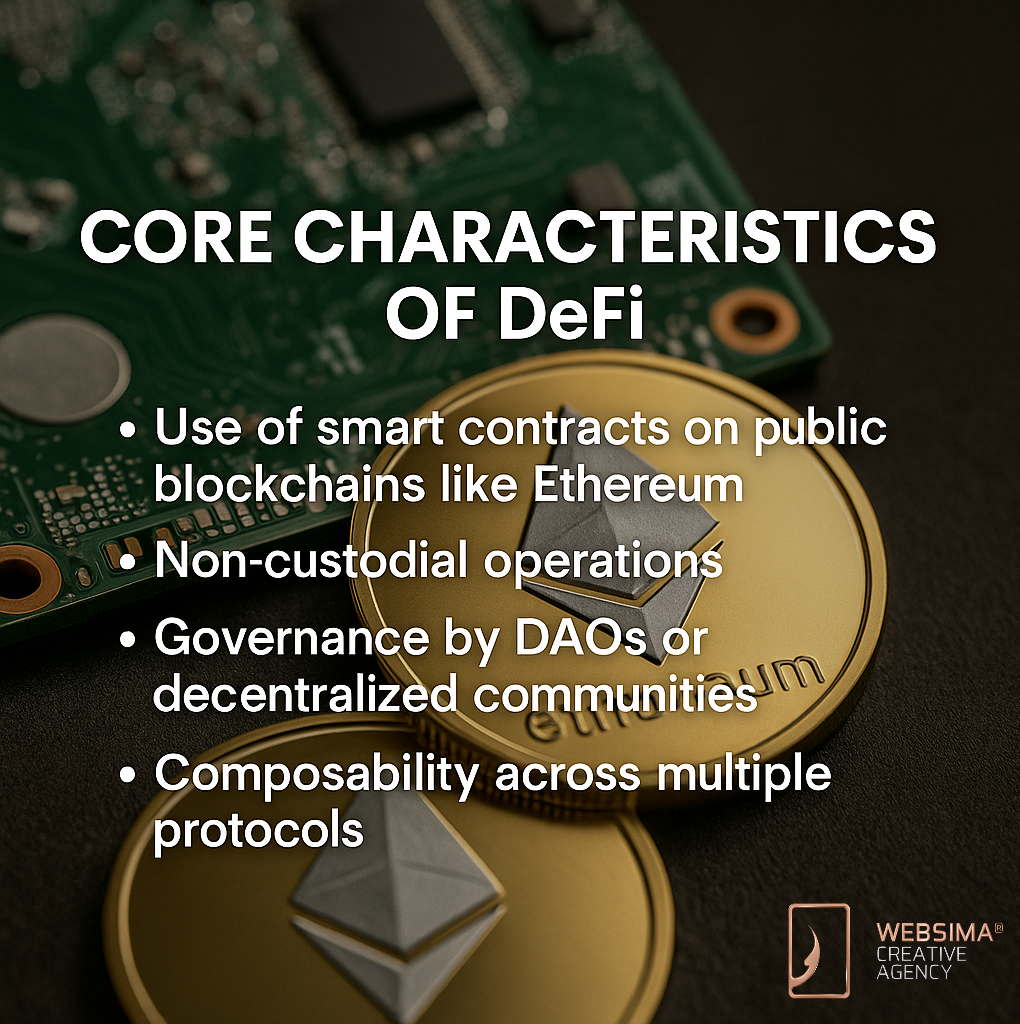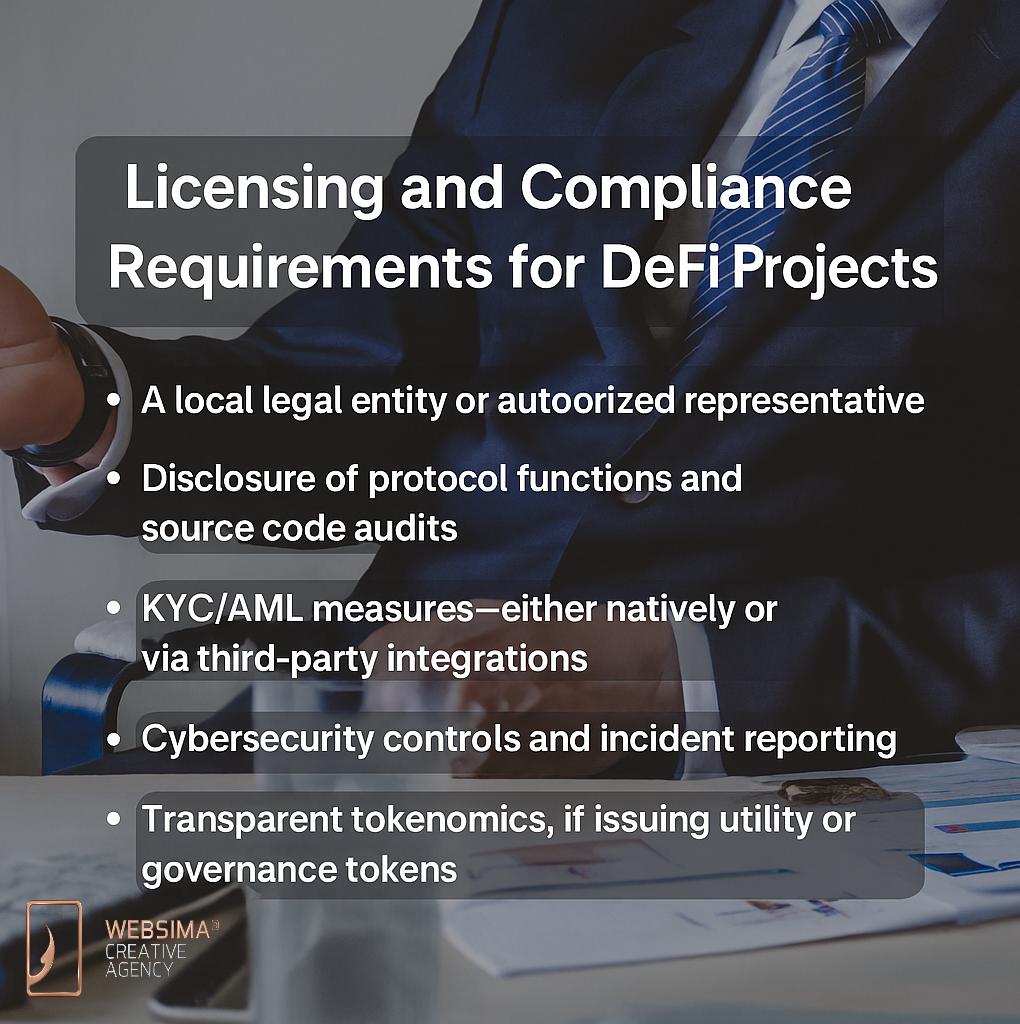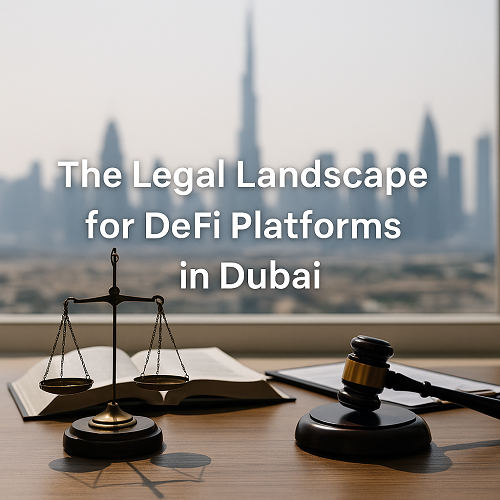Table of Contents
- Introduction
- Understanding DeFi and Its Disruptive Nature
- Overview of the Regulatory Authorities in Dubai
- Current DeFi Regulations in Dubai: An Evolving Framework
- Licensing and Compliance Requirements for DeFi Projects
- Legal Risks Facing DeFi Platforms in the UAE
- Case Study: A Hypothetical DeFi Lending Protocol Under VARA
- How Dubai’s Approach Compares Globally
- Common Legal Challenges for Developers and Investors
- Frequently Asked Questions (FAQs)
- Conclusion
- Partner with Websima for Legal-Compliant Blockchain Development
Introduction
The rise of decentralized finance (DeFi) has revolutionized the global financial ecosystem, enabling borderless lending, staking, swapping, and yield generation without the need for centralized intermediaries. But with innovation comes complexity—especially on the legal front. As a regional leader in blockchain innovation, Dubai has made considerable strides in defining legal parameters for DeFi platforms. Yet, the regulatory environment remains nascent and fast-evolving. However, there are opportunities and risks associated with DeFi investment in UAE and Dubai.
This article breaks down the core components of DeFi regulations in Dubai, offering developers, entrepreneurs, and investors critical insights into compliance, licensing, and risk management.
UAE Just Opened the RWA Floodgates!
Dubai has officially approved the FIRST-EVER tokenized money market fund — a historic milestone for real-world assets.
RWAs are now fully legal and tradable on-chain in Dubai. pic.twitter.com/Kd3P4dMxOj
— Coin Bureau (@coinbureau) July 8, 2025
Understanding DeFi and Its Disruptive Nature
DeFi, or Decentralized Finance, refers to blockchain-based protocols that replicate traditional financial services—such as lending, borrowing, or trading—on permissionless networks without intermediaries.
Core characteristics of DeFi include:

- Use of smart contracts on public blockchains like Ethereum
- Non-custodial operations
- Governance by DAOs or decentralized communities
- Composability across multiple protocols
These very features, while empowering, pose unique regulatory challenges that authorities like Dubai’s Virtual Assets Regulatory Authority (VARA) are actively addressing.
Overview of the Regulatory Authorities in Dubai
Dubai’s regulatory ecosystem for digital assets includes multiple bodies, each with its role:
- VARA (Virtual Assets Regulatory Authority): Oversees licensing and regulatory guidance for all virtual asset activities in Dubai (except DIFC).
- DIFC (Dubai International Financial Centre): Regulated by the DFSA (Dubai Financial Services Authority), which has its own framework for digital and virtual assets.
- UAE Securities and Commodities Authority (SCA): Works with VARA on federal-level guidelines.
For DeFi platforms, understanding which jurisdiction you fall under (mainland, DIFC, or ADGM) is crucial.
Current DeFi Regulations in Dubai: An Evolving Framework
The legal framework governing DeFi in Dubai is still being finalized, but key trends and draft guidelines include:
- VARA’s Virtual Assets and Related Activities Regulations 2023: This regulatory document mandates all virtual asset providers (VASPs), including DeFi-related services, to obtain licensing for certain operations.
- Activity-specific permissions: Protocols offering lending, staking, or custodial-like functions may require explicit approval.
- Technology-neutral compliance: Smart contracts are considered part of the operational stack subject to audit and legal responsibility.
Although Dubai embraces innovation, it seeks to ensure AML/CFT compliance, consumer protection, and platform accountability—even when the service is decentralized.
Licensing and Compliance Requirements for DeFi Projects
Although fully autonomous DeFi platforms are harder to license under traditional models, Dubai expects:

- A local legal entity or authorized representative
- Disclosure of protocol functions and source code audits
- KYC/AML measures—either natively or via third-party integrations
- Cybersecurity controls and incident reporting
- Transparent tokenomics, if issuing utility or governance tokens
Platforms that interact with fiat on-ramps or custody user funds may also fall under stricter regulation.
Legal Risks Facing DeFi Platforms in the UAE
Operating a DeFi project in Dubai without compliance could expose founders and users to several risks:
- Fines or criminal liability under AML laws
- Blacklisting of tokens or smart contracts
- User lawsuits due to lack of disclosures or failed security
- Freezing of UAE-based assets or domain takedowns
Even if the smart contract is deployed anonymously, any front-end interface, team member, or marketing entity located in Dubai could be held accountable.
Case Study: A Hypothetical DeFi Lending Protocol Under VARA
Project: OmegaLend — A decentralized lending platform using overcollateralized loans on a non-custodial model.
Scenario: OmegaLend wants to launch in Dubai, allow UAE-based users, and integrate with a stablecoin backed by dirhams.
Steps Taken:
- Incorporated a local tech services firm under DMCC
- Applied for VASP licensing under VARA
- Implemented Chainalysis integration for on-chain AML tracking
- Submitted audited smart contracts and documentation
- Underwent a sandbox period with limited user caps
Outcome: Post-approval, OmegaLend received media coverage, gained user trust, and set a regional precedent for DeFi compliance.
How Dubai’s Approach Compares Globally
| Jurisdiction | Stance on DeFi | Licensing Structure | Regulatory Priority |
| Dubai | Progressive, controlled | VARA, DIFC/DFSA | Compliance-first |
| USA | Uncertain, fragmented | SEC, CFTC conflict | Investor protection |
| EU (MiCA) | Framework in progress | Passporting planned | AML/CFT |
| Singapore | Balanced, pro-innovation | MAS licensing | Consumer safeguards |
Dubai stands out for welcoming innovation but enforcing clear legal boundaries through activity-specific frameworks.
Common Legal Challenges for Developers and Investors
- Smart contract audit liabilities: Even open-source code must meet regulatory clarity.
- Token classification: Governance tokens may be treated as securities under certain circumstances.
- DAO participation: Founders involved in decision-making may still be accountable.
- Cross-border access: If users from outside UAE access the app, international laws may apply.
Staying legally agile means combining legal counsel with modular protocol design that can adapt to regulatory updates.
Frequently Asked Questions (FAQs)
Can I deploy a DeFi app anonymously and still be compliant in Dubai?
Not if you plan to operate or market within Dubai’s jurisdiction. Legal presence and disclosure are required.
Does every DeFi protocol need VARA licensing?
Not necessarily, but any app offering financial services to UAE residents should undergo legal review.
Are DAOs legal in the UAE?
Currently, DAOs are not recognized as legal entities, but operating through a licensed corporate wrapper is allowed.
Can I use an offshore company for DeFi development?
You can, but interaction with UAE-based users requires compliance under local regulations.
Is token issuance regulated under VARA?
Yes. Tokens must meet utility, security, and financial instrument criteria defined by VARA.
Conclusion
There are top DeFi platforms operating in the UAE and Dubai and the horizon looks bright for more DeFi startups to come. In such a fast-paced market, Dubai has taken a bold yet cautious stance on decentralized finance. By offering a structured licensing regime through VARA while leaving room for innovation, the city is shaping up to be a regional DeFi leader.
Entrepreneurs and developers must understand that compliance is not optional—especially when offering services in high-growth areas like lending, yield farming, or staking. While the DeFi regulations in Dubai are evolving, the path forward is clearer than in most global markets.
With the right legal entity, technical transparency, and proactive communication with authorities, DeFi projects can build trust while accessing one of the most forward-looking crypto ecosystems in the world.
Partner with Websima for Legal-Compliant Blockchain Development
At Websima, we specialize in blockchain development, smart contract auditing, legal consulting, and regulatory support tailored to Dubai’s fast-changing compliance landscape.
Whether you’re launching a DeFi protocol, deploying a DAO, or tokenizing financial services, we can help you:
- Navigate VARA licensing and documentation
- Design compliant smart contracts
- Integrate AML/KYC protocols into DeFi stacks
- Structure your corporate entity within UAE free zones
Contact Websima today to future-proof your decentralized project in one of the world’s most exciting crypto hubs.





